News
Parents of transgender kids share hardship stories on Capitol Hill
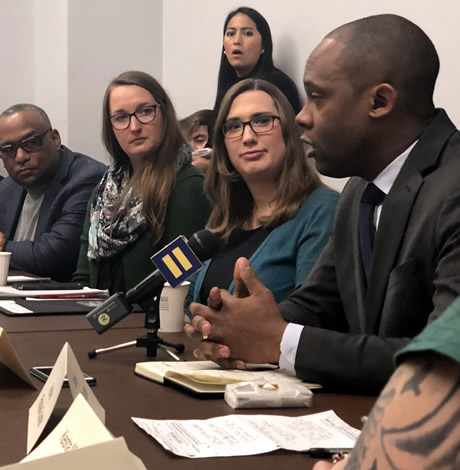
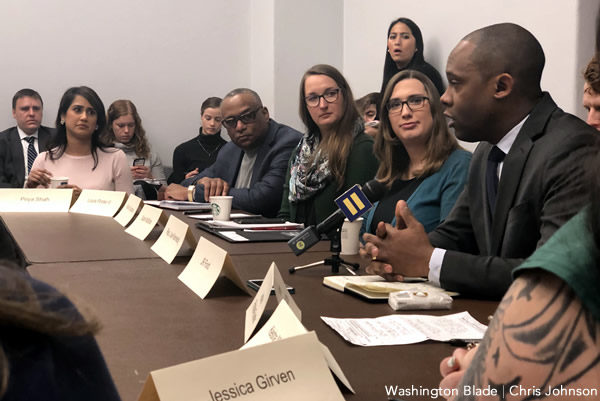
The parents of transgender children met on Capitol Hill Wednesday to share stories about hardships their families have encountered, including anti-trans policies of the Trump administration.
The parents gathered for a one-hour meeting at the Cannon House Office Building for a public meeting hosted by Rep. Joseph Kennedy III (D-Mass.), chair of the Transgender Equality Task Force. The meeting followed a two-day summit of the Parents for Transgender Equality National Council at the Human Rights Campaign building in D.C.
Rachel Gonzales, who lives in the Dallas area and is the mother of three children, told the story of how her transgender daughter “became progressively anxious and depressed and angry” before she transitioned.
“My husband and I were really at odds with how to handle her increasing need to feminize her presence,” Gonzales said. “And, as she became more aware of other people’s perception of her as a boy, she just hit a wall where she expressed to us that she could not go on any longer with anyone thinking she was a boy, that she needed Santa Claus to turn her into a girl.
That changed, Gonzales said, when she allowed her daughter to transition socially by starting to wear girls’ clothing and growing her hair long.
“She became happier and we changed her name and her pronouns, and she started to come back out of that dark cloud,” Gonzales said. “And we really were anxious about living in Texas, what that would be like, telling her classmates in school that her name and pronouns had changed and much to our surprise, her classmates’ responses were almost comical: Of course, she’s wearing a dress? Why wouldn’t she wear a dress?”
Both Gonzalez and her transgender daughter testified before the Texas Legislature two years ago when lawmakers sought to pass an anti-transgender bathroom bill. The legislation ended up being defeated.
Louis Porter II, formerly executive director of the Council for Minnesotans of African Heritage, talked about his experience raising his non-binary gender expansive child named Zeam, saying he was thankful for the support he found from fellow black elders in his Southern Christian tradition.
“I haven’t met a parent yet who doesn’t worry, but when your child is transgender and black, you worry even more so,” Porter said.
Priya Shah, a gender and sexuality studies teacher in Orange County, Calif., recalled crying last year when Kennedy during his response to President Trump’s State of the Union address, mentioned parents raising transgender children.
“Our daughter who was identified male at birth came to me before her seventh birthday, looked me straight in the eye and said, ‘Mom. I’m a girl. This is the situation,’” Shah said. “In a way I think we had known about that for a long time and that it was coming.”
On the first therapy sessions the family had, Shah said her daughter told her, “I’ve known since I was four, but I thought you would hate me, and I thought people wouldn’t love me.”
“She didn’t even know the word transgender, she didn’t know that it was something that you could be, and she was so scared to even tell her family,” Shah said.
At her daughter’s private school in California, Shah said her daughter wasn’t allowed to transition and was forced to wear a male uniform and go by her old name and male pronouns.
“She would come home every after school and rip the uniform,” Shah said. “One day I found a picture of her that was taken at school and she ripped it in half and said I hate myself.”
At that time, Shah said she started teaching her daughter through home schooling and sued the school, which ultimately changed its policies and started training its principals. Shah said her daughter now is a straight A student and in programs for gifted students.
“It’s a constant battle,” Shah said. “We still have parents in Orange County who want to be able to discriminate against transgender children, there’s teachers that ask if they cannot teach our children.”
Keisha Michaels, who’s black and a social worker, became emotional when she recalled the mortality rate for transgender women of color.
“We worry, we know the number, we know the statistics,” Michaels said. “We realize that transgender women of color, black transgender women, are murdered — I’ll just have to say it — at ridiculous rates in this country. And we worry, my husband and I, we worry every day about it.”
A common theme among the parents at the meeting was the need to pass the Equality Act, which would amend federal civil rights law to explicitly include LGBT people and ban anti-trans discrimination in schools.
JR Ford, a D.C.-based cybersecurity expert who lives in D.C., talked about the importance of the legislation to ensure protections for transgender kids.
“The Equality Act would help to provide protections across an entire nation for transgender youth, so they can know that they exist,” Ford said. “We can leverage state-by-state regulations and policies…It’s more beneficial for all children in this country to be protected, and so the Equality Act really is essential for essential human rights.”
Sarah McBride, a transgender advocate and spokesperson for the Human Rights Campaign, said during the meeting the Equality Act would be introduced in the “coming weeks.” Rep, David Cicilline (D-R.I.) has sponsored the legislation in the U.S. House and Sen. Jeff Merkley (D-Ore.) has sponsored the legislation in the Senate.
Another theme was the anti-transgender polices of the Trump administration. When Obama-era guidance requiring schools to allow transgender students to use the restroom consistent with their gender identity was rescinded in 2017, Ford said he approached the White House from the street and shouted at the leaders inside.
Jessica Girven, the mother of a transgender daughter in the U.S. military stationed in Germany, became angry when she recalled the Trump administration rescinding the policy ensuring non-discrimination for transgender kids in school.
“The assistant secretary of defense under Obama issued an inclusive affirming policy at all Department of Defense schools and MWR facilities around the world,” Girven said. “So, for the first time, families didn’t have to worry what happens when we move?…Will my child not be able to go to school? Will we be able to rent a house? We had this beautiful policy for four months. It was one of the first things that was rescinded under this administration.”
One participant in the meeting who shared an unexpected story was Rep. Jan Schakowsky (D-Ill.), who talked about her soon-to-be 21-year-old transgender grandson Isaac and his process of transitioning.
“I asked him, I said, ‘Growing up was this an issue for you because our family’s very close, he always seemed very happy. He said, ‘I just never knew it was an option, and, you know, I felt loved and accepted in the family.’”
Schakowsky said her grandson is preparing to have gender reassignment surgery for a double mastectomy and has had eggs frozen to ensure he can be a biological parent in the future.
Other lawmakers in attendance were Reps. Sean Patrick Maloney (D-N.Y.), Mary Gay Scanlon (D-Pa.), Mark Takano (D-Calif.), Chris Pappas (D-N.H.) as well as Rep. Jennifer Wexton (D-Va.), Mike Quigley (D-Ill.), Gil Cisneros (D-Calif.) and Alan Lowenthal (D-Calif.).
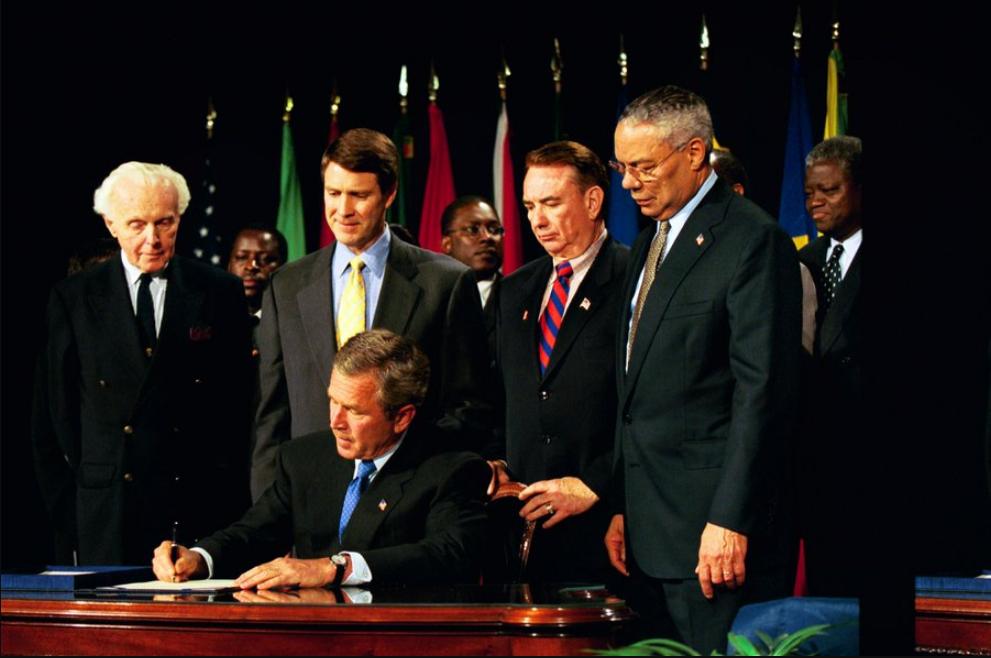
The President’s Emergency Plan for AIDS Relief marks its 20th anniversary Saturday, marking the largest commitment by any nation to address a single disease in the world.
The initiative which was personally led and launched by former President George W. Bush in 2003, its funding has totaled more than $110 billion to date, including funding for the Global Fund to Fight AIDS, Tuberculosis and Malaria (Global Fund), to which the U.S. government is the largest donor.
PEPFAR is credited with saving millions of lives and helping to change the trajectory of the global HIV epidemic. The White House today released a statement by President Joe Biden marking the 20th anniversary:
“20 years ago today, President George W. Bush declared that preventing and treating HIV/AIDS was a foreign policy priority of the United States. At a time when nearly 30 million people were HIV positive, but very few were receiving life-saving medicines, the President’s Emergency Plan for AIDS Relief (PEPFAR) transformed the global AIDS response and laid a marker for America’s commitment to countries that were impacted the hardest by the AIDS epidemic. Helping lead the bipartisan effort in Congress to authorize PEPFAR is among my proudest achievements from my time in the Senate. To this day, PEPFAR remains a powerful example of America’s unmatched ability to drive progress and make life better for people around the world.
Since 2003, PEPFAR has saved more than 25 million lives and dramatically improved health outcomes in more than 55 partner countries. AIDS-related deaths have declined by 68 percent since their peak in 2004, and new HIV infections are down 42 percent. PEPFAR investments have ensured that 5.5 million babies have been born HIV-free. And two decades of investment in partner nations’ health systems played a critical role in countries’ ability to respond to other health crises such as COVID-19, Mpox, and Ebola.
Today, PEPFAR continues to support 20.1 million people around the world with HIV/AIDS treatment, and my administration is committed to continuing to lead the global HIV/AIDS response. We will build on our decades of progress to reach the Sustainable Development Goal of ending AIDS by 2030, work to eliminate the stigma and inequities that keep people from accessing care, and keep the voices of people living with HIV/AIDS at the center of our response. I look forward to working with Congress on PEPFAR’s reauthorization this year.”
PEPFAR is overseen by the U.S. Global AIDS Coordinator, who is appointed by the president, confirmed by the Senate, and reports directly to the secretary of state, as established through PEPFAR’s authorizing legislation.
PEPFAR’s original authorization established new structures and authorities, consolidating all U.S. bilateral and multilateral activities and funding for global HIV/AIDS. Several U.S. agencies, host country governments and other organizations are involved in implementation.
Dr. John Nkengasong, the current coordinator was sworn in on June 13, 2022, and holds the rank of ambassador leading the Office of the Global AIDS Coordinator at the State Department.
Twenty years ago this month, President George W. Bush announced #PEPFAR during his State of the Union address. Since then, the U.S. government has invested $100B+ in the global HIV/AIDS response through PEPFAR, saving 25M lives & bringing us closer to #EndAIDS2030. #PEPFAR20 pic.twitter.com/SMAOHWPZ03
— PEPFAR (@PEPFAR) January 11, 2023
Nobel Prize winning scientist Harold Varmus, who served as director of the National Institutes of Health from 1993-1999 and currently the Lewis Thomas University Professor of Medicine at Weill Cornell Medicine in New York, wrote in an article honoring World Aids Day 2013:
[…] “the PEPFAR story must begin with George W. Bush and his wife, Laura, and their interests in AIDS, Africa, and what Bush termed “compassionate conservatism.” According to his 2010 memoir, “Decision Points,” the two of them developed a serious interest in improving the fate of the people of Africa after reading Alex Haley’s “Roots” and visiting the Gambia in 1990. In 1998, while pondering a run for the U.S. presidency, he discussed Africa with Condoleezza Rice, his future secretary of state; she said that, if elected, working more closely with countries on that continent should be a significant part of his foreign policy. She also told him that HIV/AIDS was a central problem in Africa but that the United States was spending only $500 million per year on global AIDS, with the money spread across six federal agencies, without a clear strategy for curbing the epidemic.”
Key Facts (As provided by Kaiser Health and Family Foundation)
- Although the U.S. has been involved in efforts to address the global AIDS crisis since the mid-1980s, the creation of PEPFAR in 2003 marked a significant increase in funding and attention to the epidemic.
- PEPFAR is the largest commitment by any nation to address a single disease in the world; to date, its funding has totaled more than $110 billion, including funding for the Global Fund to Fight AIDS, Tuberculosis and Malaria (Global Fund), to which the U.S. government is the largest donor. PEPFAR is credited with saving millions of lives and helping to change the trajectory of the global HIV epidemic.
- U.S. funding for PEPFAR grew from $2.2 billion in FY 2004 to $7.0 billion in FY 2022; FY 2022 funding includes $5.4 billion provided for bilateral HIV efforts and $1.6 billion for multilateral efforts ($50 million for UNAIDS and $1.56 billion for the Global Fund.)
- As the COVID-19 pandemic continues to have profound effects across the world, PEPFAR has acted to respond to COVID-19 in countries that receive support in order to minimize HIV service disruptions and leverage the program’s capabilities to address COVID-19 more broadly.
- Looking ahead, PEPFAR faces several issues and challenges, including how best to: address the short- and long-term impacts of COVID-19 on PEPFAR and the HIV response; accelerate progress toward epidemic control in the context of flat funding; support and strengthen community-led responses and the sustainability of HIV programs; define its role in global health security and broader health systems strengthening efforts; and continue to coordinate with other key players in the HIV ecosystem, including the Global Fund.
Key Activities and Results (As provided by Kaiser Health and Family Foundation)
PEPFAR activities focus on expanding access to HIV prevention, treatment and care interventions. These include provision of antiretroviral treatment, pre-exposure prophylaxis (PrEP), voluntary male circumcision, condoms and other commodities related to HIV services. In addition, PEPFAR has launched specific initiatives in key strategic areas. For example, in 2015, PEPFAR launched DREAMS, a public-private partnership that aims to reduce HIV infections in adolescent girls and young women.
The latest results reported by PEPFAR indicate that it has:
- Supported testing services for 63.4 million people in FY 2021;
- Prevented 2.8 million babies from being born with HIV, who would have otherwise been infected;
- Provided care for more than 7.1 million orphans and vulnerable children;
- Supported training for nearly 300,000 new health care workers; and
- Supported antiretroviral treatment for 18.96 million people.
- In the 15 countries implementing the DREAMS initiative, new diagnoses among adolescent girls and young women have declined with most DREAMS areas (96 percent) experiencing declines greater than 25 percent and nearly two-thirds with declines greater than 40 percent.
The achievements of the PEPFAR program have been remarkable, well-documented by outside evaluators, and hugely applauded throughout the advocacy community and the developing world. In general, milestones have been met, the program has been enlarged (for instance, to include some research on implementation of medical assistance), the roster of PEPFAR countries has grown and spending plans have not been exceeded.
News
Nonbinary Department of Energy official replaced after felony theft charges
Sam Brinton allegedly stole suitcase at Minneapolis airport
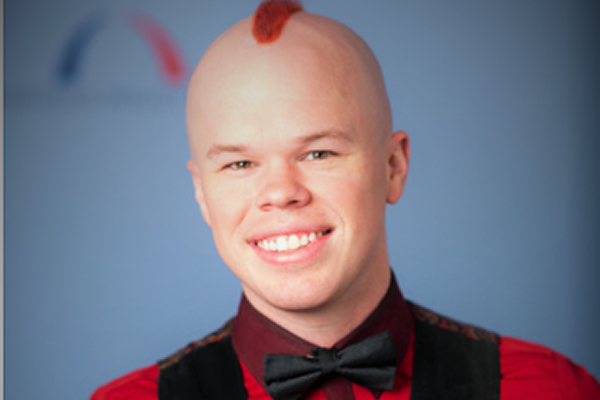
The Department of Energy replaced a nonbinary senior official who had served as the agency’s deputy assistant secretary for spent fuel and waste disposition after they were charged with a felony over an incident at Minneapolis-St. Paul International Airport on Sept. 16.
Sam Brinton, whose departure from the Energy Department was confirmed by a spokesperson to the New York Post, did not immediately respond to the Washington Blade’s request for comment via Facebook Messenger.
Brinton, who has dual degrees from MIT and years of experience in nuclear waste management and climate change work, is also an LGBTQ activist who made history this year with their appointment as the first openly gender-fluid person to serve in a senior government post.
A 2018 column in the Los Angeles Times argued there was a cultural shift afoot towards greater acceptance of transgender and gender fluid people — using, as an introductory anecdote, Brinton’s appearance at the Academy Awards. According to the author, Brinton spoke passionately about their suicide prevention work for the Trevor Project and was embraced by Hollywood icons like Jane Fonda.
They also encountered some hateful backlash from anti-LGBTQ figures on the right, which was renewed on Monday with the news about Brinton’s dismissal pursuant to the felony charges filed against them, which conservative-leaning outlets were among the first to report.
Extreme right-wing Congresswoman Marjorie Taylor Greene (R-Ga.) published an offensive tweet yesterday targeting Brinton and their nonbinary identity:
Stealing women’s purses and identity.
— Rep. Marjorie Taylor Greene🇺🇸 (@RepMTG) November 28, 2022
Classic. https://t.co/yCVhMfLaQX
According to reporting in the New York Post, during an initial conversation with police, Brinton allegedly denied that they had stolen another passenger’s suitcase. Subsequently, Brinton told investigators they accidentally grabbed the wrong bag at the luggage carousel by mistake out of exhaustion.
Court filings indicate that Brinton, upon realizing they had mistakenly taken someone else’s bag, emptied its contents into dresser drawers in their hotel room, anxious about the prospect of facing accusations of property theft.
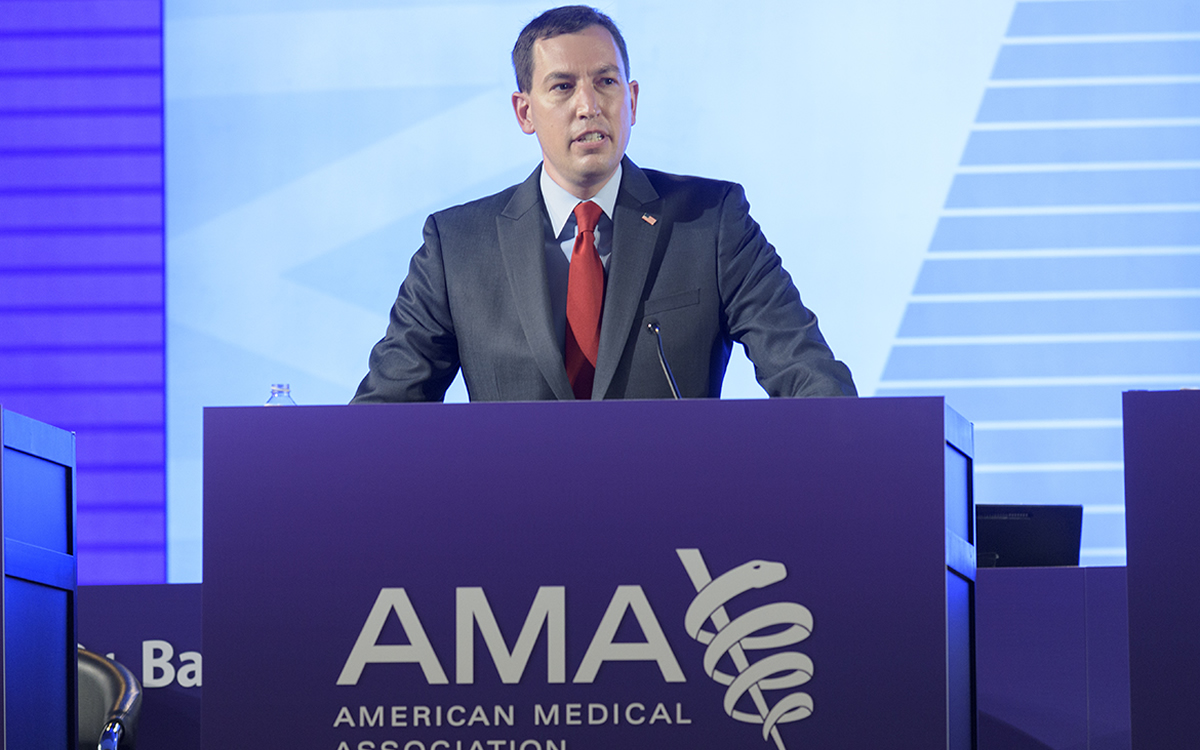
Physicians and medical students have elected Wisconsin-based anesthesiologist Dr. Jesse Ehrenfeld as the first openly gay president-elect of the American Medical Association (AMA).
Ehrenfeld was elected June 14 at the AMA House of Delegates’ annual meeting.
“Well, it’s certainly just an amazing feeling to know that you’ve got the confidence of your colleagues from such a broad array of practice types of modalities and perspectives,” Ehrenfeld told the Washington Blade during a telephone interview. “The association is a very diverse and increasingly diverse organization, and that’s a good thing. It’s more representative of the country and to see such broad support for a vision to move forward was really sort of heartening for me.”
The anesthesiologist and LGBTQ health expert will also serve as the first openly gay AMA president when he steps into the position later this month.
“When I joined the AMA 22 years ago, roughly, I didn’t think it was possible that a gay person could be the AMA president. And certainly 175 years ago, when the AMA was founded, that felt like something that wouldn’t have been possible,” Ehrenfeld said. “And so, to look at how the association, how medicine, health professional organizations have evolved, it’s pretty remarkable when you look at what that has looked like, and that’s a reflection of society in general. But certainly, you know, another pink ceiling has been shattered.”
Ehrenfeld previously served on the AMA’s Board of Trustee’s Executive Committee. He also worked on the AMA Recovery Plan for America’s Physicians; a long-term project that was unveiled at the annual meeting.
“A big component of that is helping physicians prepare the health system so that we can make sure that we can renew our commitment to achieving optimal health for all,” Ehrenfeld said. “To do that, we have to make sure that we prioritize the needs of physicians to improve patient care.”
Ehrenfeld is an associate dean and tenured professor of anesthesiology at the Medical College of Wisconsin and has advocated for issues affecting multiple marginalized communities, such as transgender representation in the military. He emphasized the importance of diversifying the medical field to ensure better service for patients.
“We need folks from every community but particularly marginalized communities to step forward and enter the profession. That’s how patients get better care,” Ehrenfeld said “There’s data that when we have a more diverse healthcare workforce, and when we’re a more diverse community, that those health disparities inequities, actually start to go away.”
-

 Virginia4 days ago
Virginia4 days agoMcPike wins special election for Va. House of Delegates
-

 New York5 days ago
New York5 days agoN.Y. lawmaker vows ‘Pride flag will fly again’ at Stonewall Monument
-

 District of Columbia5 days ago
District of Columbia5 days agoU.S. Attorney’s Office drops hate crime charge in anti-gay assault
-

 a&e features5 days ago
a&e features5 days agoMeet D.C.’s Most Eligible Queer Singles














